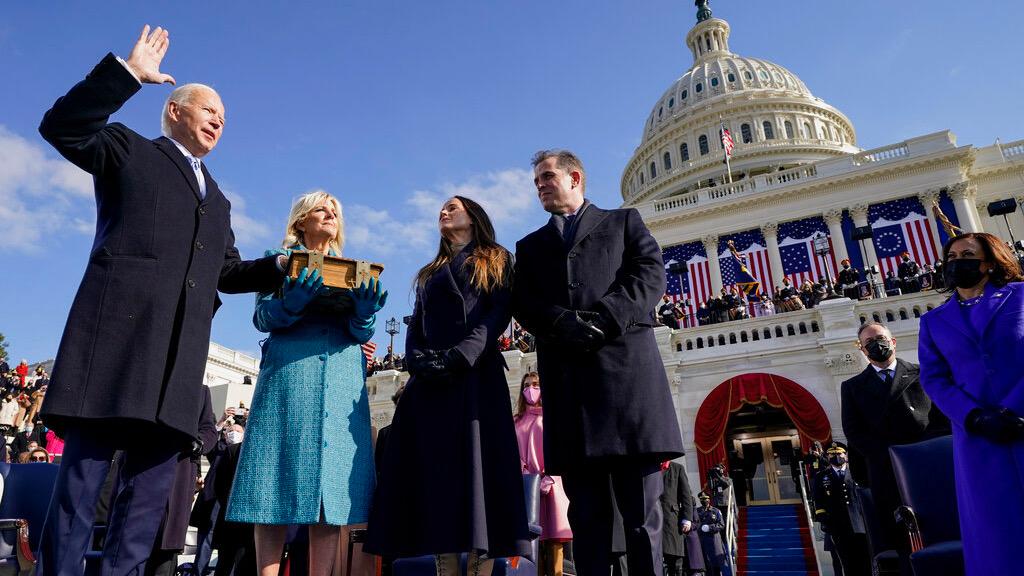Democratic President Joe Biden and Vice President Kamala Harris were sworn into office in a pandemic-friendly, high-security ceremony in Washington, DC, on Wednesday.
Harris is now the highest-ranking woman and woman of color to ever hold national government office. Prior to Wednesday’s formal proceedings, Biden’s Cabinet nominees began confirmation hearings in the Senate.
Related: Watch live: Biden takes the helm as president — ‘Democracy has prevailed’
In a break from tradition, former President Donald Trump and first lady Melania Trump were notably absent from the inaugural proceedings. Donald Trump did not immediately concede the election, and his final days in Washington were rife with conflict. He was impeached for a historic second time by the US House following Jan. 6’s deadly insurrection at the Capitol.
Related: Watch live: Biden’s national security Cabinet nominees face Senate tests
Biden, who plans to undo plenty of the Republican president’s policies, is inheriting a great many challenges from the Trump administration while the pandemic continues to wreak havoc across the globe and economies falter. The coronavirus, climate and environment, immigration, national security and US-China trade relations are just some of the key policy areas that Biden will begin focusing on, starting on Day One.
“We have much to do in this winter of peril, and significant possibilities. Much to repair, much to restore, much to heal, much to build and much to gain.”
“We have much to do in this winter of peril, and significant possibilities. Much to repair, much to restore, much to heal, much to build and much to gain,” Biden said during the inaugural address, stressing the need to overcome political divisiveness.
Here’s a roundup of presidential transition coverage on The World that will get you caught up on what’s in store as Biden steps into the White House.
Coronavirus
In the lead-up to the election, many voters said they were disappointed in Donald Trump’s response to the coronavirus and it was a deal-breaker at the polls, including for 18-year-old Jacob Cuenca, of Homestead, Florida.
“He has fallen. There’s no way he’s going to be able to resurrect himself.”
“He has fallen,” Cuenca said of Donald Trump prior to Election Day. “There’s no way he’s going to be able to resurrect himself.”
Donald Trump, who himself got COVID-19, was not in sync with top infectious disease expert, Dr. Anthony Fauci, about staving off the pandemic that has already claimed more than 400,000 lives in the US.
“If we can get the overwhelming majority of people vaccinated, we can put an end to this outbreak,” Fauci, who will be part of the Biden administration team in charge of managing the pandemic, told The World.
In addition, other less wealthy countries are faced with a dearth of vaccines as a result of “vaccine nationalism.”
Climate
While all eyes were on the US Capitol attack and its aftermath, the Trump administration plowed on with a Jan. 6 auction of oil and gas drilling leases in the Arctic wildlife refuge. Biden plans to reverse this by executive order.
Previously, Donald Trump pulled the US out of the Paris climate agreement and pressures from his administration to downplay environmental issues have been detrimental to the Arctic Council. Biden has also said he will restore US involvement in the accord.
Immigration
Donald Trump’s hard-line, anti-immigrant rhetoric and border wall plans have been front and center since he entered office. Biden says he will overturn immigration policies such as the bilateral agreements the Trump administration made with Guatemala, Honduras and El Salvador to keep asylum-seekers away from the US-Mexico border.
He is also canceling the travel ban against Muslim-majority countries. But it’s unclear how the Biden administration will handle the controversial “Remain in Mexico” policy as he has walked back his promises to undo it.
National security
The recent violence at the Capitol has exposed a national security issue brewing from within the country: white extremism.
Fiona Hill, who was a top Russia adviser, said the attack “has all the elements of a civil conflict.”
And, some warn that a similar breach could happen again while misinformation continues to circulate online, with dangerous offline implications. US scholars and other observers say the events signal the “death of American exceptionalism.”
Canada, seeing the rise of US-inspired, right-wing extremism within its borders, may designate the Proud Boys, who’ve been connected to the recent Washington events, as a terrorist group.
A former FBI agent says that the Capitol breach requires a 9/11-style commission. Michael McFaul, who was the US ambassador to Russia from 2012 to 2014, says Biden, together with his State Department pick, Antony Blinken, has a chance to restore US footing on the world stage.
“They share a similar worldview, and that means a lot in diplomacy, because every time Secretary Blinken, I hope that’ll be the case, goes abroad, everyone will know that they are speaking directly to somebody that has direct access to the president.”
“They share a similar worldview, and that means a lot in diplomacy, because every time Secretary Blinken, I hope that’ll be the case, goes abroad, everyone will know that they are speaking directly to somebody that has direct access to the president.”
US-China relations
Biden steps into fraught US-China relations. Over the past four years, the power struggle with China has centered on trade.
Recently, the Trump administration banned cotton products from China’s Uighur region over forced labor concerns. US Secretary of State Mike Pompeo said China has “committed genocide” against the Uighur ethnic group.
The US also drew a red line, saying that China cannot name Tibetan Buddhism’s next leader.
